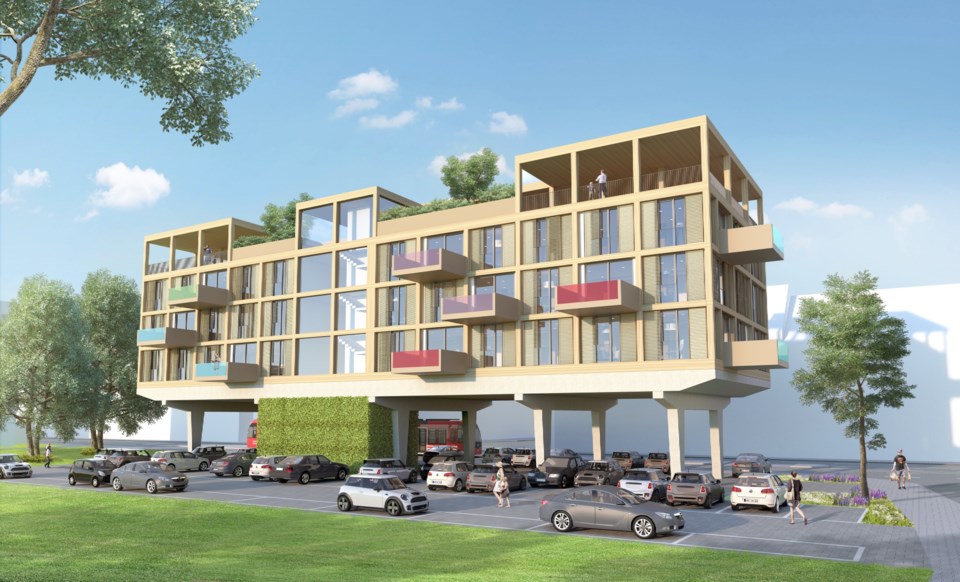Cambridge has officially missed its opportunity to be the local leader in exploring affordable housing options.
The Region of Waterloo will vote tonight on the idea to explore the possibility of building housing over municipal parking lots and other surplus land.
The vote comes two days after Kitchener city council unanimously passed a similar motion.
The Cambridge city councillor who brought the motion forward last month only to see it defeated in a 5-4 vote will be at tonight's regional meeting delegating in its favour.
"I think this is a step in the right direction," said Scott Hamilton of the Kitchener decision. "Hopefully other municipalities in our area, in the province and across the country will pick it up, because I think there's a lot of potential to do it."
"The only way to know what we can do with this, and what potential it has, is to explore it."
The key to the concept of using city owned parking lots for affordable housing, and what makes it unique, is the idea of leasing the land for $1 a year on a 50-year lease as an incentive to not-for profit developers.
The motions being read at the region tonight and approved by Kitchener are slightly different than Hamilton's as both municipalities were already looking at affordable housing solutions, but will now focus on parking lots and other surplus public property as viable land options.
"This is for under-utilized lots to be looked at for housing, rather than just as a concrete wasteland that people would have discounted offhand before," explained Hamilton.
He pitched the idea of build housing over parking in Cambridge with the notion that public parking spaces could be retained under medium density housing units perched on stilts.
That doesn't necessarily have to happen in Kitchener where higher density projects could be considered.
Access to public transit reduces the need for surface parking lots and Kitchener already has a number of downtown parking structures that fit the bill.
The whole premise is about bringing housing to the cores of cities, where it's needed most, while maintaining control over the land, Hamilton said.
It allows municipalities to set the terms for the affordable units and keep it out of the hands of for-profit private sector investors.
Associate professor in the school of planning at the University of Waterloo Brian Doucet calls the idea of using public land to build genuinely affordable housing the best way cities can address the housing crisis while producing the kind of supply that we actually need.
"I think the City of Kitchener already understood that," he said, offering the example of an affordable housing development coming to property on Block Line Road.
He called the four-tower 450 unit project on city owned property one of the best local examples of this kind of public land use.
Another is on Lauris Avenue in Cambridge, where surplus land owned by the region is expected to become a 104-unit affordable housing apartment when the region finds the right non-profit developer for the project.
"Use that asset, use that land, don't sell it off to a developer," Doucet said.
The Canada Research Chair in Urban Change and Social Inclusion says these types of initiatives can come with a range of different ideas and partnerships that simply aren't feasible in the private, for-profit housing market.
"These sites provide an opportunity to do something different. Something that you really couldn't achieve on land owned by private developers."
It could also help municipalities reach provincial housing targets faster and access the province's $1.2 billion Building Faster Fund.
"In a way, maybe not having this idea pass in Cambridge has catapulted this idea further," he said, adding he hopes a motion can return to Cambridge council once its feasibility is demonstrated by another municipality.
"Toronto's doing, Kitchener's doing it and I would hope Cambridge would come back to the table," Doucet said.
Kitchener Coun. Dave Shnider said he saw it as an opportunity to investigate the idea as part of that city's overall plan to address the housing crisis.
"The motion didn't pass at Cambridge council, but the idea I think sparked a lot of interest in the community and I felt it was something that is valuable for the City of Kitchener," he said in presenting the motion.
The mood around the Kitchener horseshoe was full of positivity Monday as the other councillors and mayor commended Schnider for taking action after Cambridge passed on it.
"I know our friends in Cambridge have been working on this for some time and I think they'll be very appreciative that Coun. Schnider picked up the baton and moved this along to our municipality," said Kitchener Coun. Bil Ioannidis.
"In this environment we need to have all hands on deck, explore every option and leave no stone unturned to look for housing."
Even Kitchener Mayor Berry Vrbanovic had his eye on Cambridge after Hamilton's motion failed. He's already said he will have a second chance to support it when it comes to regional council Wednesday night.
Hamilton, who helped Schnider work on his updated version for Kitchener, said the councillor "seemed very engaged and enthusiastic" when he contacted him.
"I'm very grateful that he decided to move forward with the motion and I'm very pleased to see that it passed unanimously in Kitchener," Hamilton said.
He added that regardless of where this concept started or where it goes, the goal is to help people find housing that they're in dire need of.



